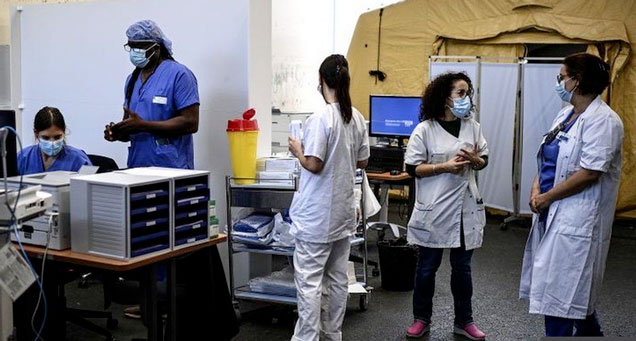By granting citizenship to coronavirus workers, France has boosted the spirits of thousands of frontline workers his week – following through with a coronavirus-era promise. In September, the government told many in its immigrant population, “if you stick your neck out for the country during these challenging times, we got your backs.” As promised, the country has come through.

This week, France kept its promise. According to the BBC, the country granted citizenship to coronavirus workers or was fast-tracking (expediting) the naturalization applications for some 700 foreigners who were exposed to the coronavirus through their frontline work. Seventy-four people have already been granted a French passport and another 693 are in the final stages. A total of 2,890 people have applied so far.
Foreign workers gave their time and swung into action for all of us during the Covid crisis. Health professionals, cleaning ladies, childcare workers, checkout staff: they all proved their commitment to the nation, and it is now the turn of the republic to take a step towards them.
Marlène Schiappa, France’s junior minister for citizenship
Citizenship To Coronavirus Workers – La Différence Française
This is in stark contrast to the heartbreaking stories of two-tour Iraq war veterans, deported from the United States to Mexico and other places, for petty crimes, in the Trump era. Service to country (as they had thought) had earned them neither path to citizenship nor the benefit of a mistake.
Likewise, British Prime Minister Boris Johnson emerged from the hospital this spring with neither fresh recognition of immigrant contributions to Britain nor sympathies for those who kept the National Health Service afloat during Britain’s coronavirus pandemic. Mr. Johnson thanked his Portuguese and New Zealand nurses for keeping him alive through nights in intensive care when his prognosis was 50/50, then proceeded to expedite deportations and hostility to the immigrant community in his vocal campaign to expedite Brexit.
Further impressive is the frontline workers’ population subjected to this expedited naturalization process: the issuance of citizenship to coronavirus workers went beyond the tradional doctors and nurses and includes garbage collectors, housekeepers, cashiers, and other shop workers.

Bracing itself for a second wave of the pandemic, France initiated the policy in September. Those who were identified as having been exposed to coronavirus infection through their work were then put on the fast-track for naturalization review under the order to issue citizenship to coronavirus workers.
Tunisian-born physiotherapist, Aziz Youssef, migrated to France in 2014. He told The New York Times that for him, getting citizenship by naturalization amounted to “an obstacle course.” He views France’s expedited process to grant citizenship as a form of recognition for his work, which has greatly boosted his spirits.
He recalled first sending an application in late 2016 after graduating with a physiotherapy degree and being given an appointment for a year later. He has attended dozens of isolated patients during the first wave of the pandemic and had expected completion of his application in 2022 – a whole six years after filing it. But after learning of the government’s new exceptions for citizenship to coronavirus workers, he checked in with the local authorities, who then fast-tracked him. He had his interview in early December.

Under normal circumstances, a successful applicant must have been resident in France for five years with a stable income and having demonstrated integration into French society (speaking French is a must) to obtain citizenship. But the government offered to give citizenship to frontline coronavirus workers with only two years in France the eligibility to apply in recognition of their “great services rendered.”
France’s tradition of awarding citizenship for valor is deep in its history. The famed French Foreign Legion welcomed combatants from all walks of life who were ready and willing to take up arms in defense of the republic. In the end, the reward of citizenship to those so desirous was a foregone conclusion. Even in recent times, the country has made exceptions and has issued citizenship to reward acts of bravery and recognize contributions to the nation. In 2018, for example, France gave Malian Mamoudou Gassama French citizenship after he was dubbed “Spiderman” for rescuing a small boy dangling from a Paris balcony.
Bravo La France!
If you like this story, please subscribe and share, if possible
